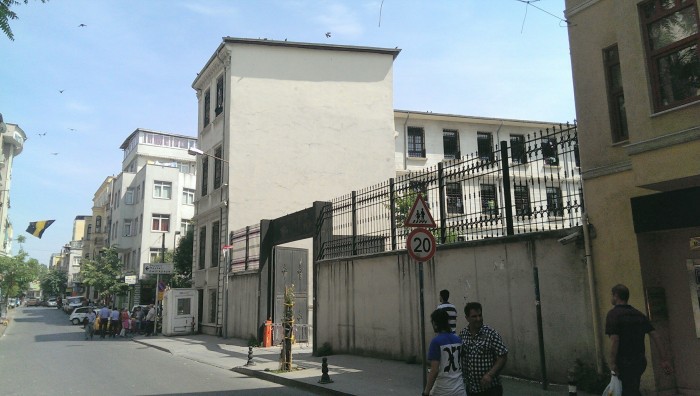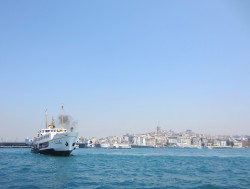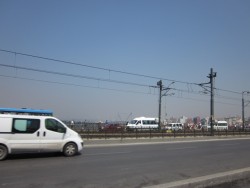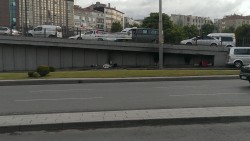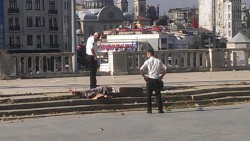In his research Mathias Fiedler illuminates the situation of refugees and migrants in the, so called, transit country Turkey. He did several in-depth interviews in Istanbul – some as a follow-up to his research he did for the project “Bordermonitoring Bulgaria“. Latest informations were collected afterwards via telephone and social media.
As I walked through the streets of downtown Istanbul, I saw a young man with a child sitting on the curb, begging for money. In the proximity of the big shopping street İstiklal Caddesi as well as in other parts of Beyoğlu, I noticed more people doing the same. As I could read on self-made signs positioned on front of them, many of them were refugees.
- View on Beyoğlu
- © Mathias Fiedler 2014
Often, children and other family members were begging for money 1. As refugees told me, some of them slept in the street, in parks or in abandoned buildings. After the outburst of the Syrian civil war, the number of Syrian refugees in Turkey reached to 1.7 Million in April 2015 2 –one year before, the NGO Mazlum Der had already registered around 300.000 Syrian refugees in Istanbul 3.
- Fire traces at a street
- Security staff checking a homeless person at Gezi Parkı © Mathias Fiedler 2015
For a long time, there has been no guaranteed refugee-status in Turkey for people coming from non-European countries due to the so-called “geographical limitation“ 4. In April 2013, a new “law on foreigners and international protection” 5 was passed by Turkey’s Grand National Assembly with the geographical limitation remaining in effect. Nevertheless, there are many people in Turkey who, having fled (civil) war or searching for a better life, are awaiting resettlement. Others transit the country in search for a way into the European Union.
Migrants in Turkey who want to apply for asylum have to register at the United Nations High Commissioner for Refugees’ (UNHCR) office in Ankara or – since 2013 – at the Association of Solidarity with Asylum Seekers and Migrants (ASAM) 6. The registration constitutes the precondition to being resettled into another country. After registration, most migrants are not allowed to work. The state decides where they are permitted to live; often, it is in small satellite cities. As few migrants want to stay there, there is a constant flow towards the bigger cities. Syrians were seen as ‘guests’ until 2014 7, not as ‘refugees’ according to Turkish law. They cannot register at the UNHCR for resettlement. Until today, their status is unclear and seen as temporary 8.
From time to time, protests against refugees in Istanbul arose. A bigger protest took place in August 2014, when around 300 Turkish citizens clashed with the police and windows were broken in the suburb of İkitelli, Küçükçekmece 9. This was not the first agitation against Syrian refugees in Turkey. In July 2014, similar incidents took place in the cities of Kahramanmaraş, Adana and Gaziantep. In Antalya, the Governor’s office asked more than 1.500 Syrian refugees to leave the city. The office justified the issued notifications with accusations of “social and economic tension” as well as damaging the tourism industry 10. Hüseyin Avni Mutlu, mayor of Istanbul, came up with the idea of deporting the begging refugees back to camps in south of the country 11. There, the situation is problematic for many refugees. As I was told by people that had visited or lived in these camps themselves, one can find the inhabitants of whole villages that fled from war together in a camp.
We met François, 12 a long-term refugee activist from Ruanda, who has been living in Istanbul for many years. As he tried to explain the protests against Syrian refugees, he stated:
“Of course Syrian people are getting such kind of small jobs, then they get small money, and then maybe Turkish people, they will not, you know. Turkish people when they get salary, they need big salary. But Syrians, because they want to survive, they will take all kind of small jobs and then young Turkish people think that Syrians are stealing jobs from them, such kind of things.”
Fußnoten:
- 1 For more information see Sauter, Dieter: Syrische Flüchtlinge in der Türkei – Betteln, Teller waschen, Müll sammeln, in: WOZ 49 (2014). https://www.woz.ch/-5770 (last accessed July 2015). ↩
- 2 European Commission. Humanitarian Aid for Civil and Protection: Eco Fact Sheet: Syria Crisis, April 2015, http://ec.europa.eu/echo/files/aid/countries/factsheets/syria_en.pdf (last accessed July 2015) ↩
- 3 Kirişci, Kemal: Syrian refugees and Turkey’s challenges: Going beyond hospitality, Washington/D.C.: Brookings Institution 2014, http://www.brookings.edu/~/media/research/files/reports/2014/05/12-turkey-syrian-refugees-kirisci/syrian-refugees-and-turkeys-challenges-may-14-2014.pdf (last accessed July 2015). ↩
- 4 Kaya, Ibrahim: Reform in the Turkish Asylum Law: Adopting the EU acquis? CARIM Research Reports (2009) 16, European University Institute, Robert Schuhmann Centre for Advances Studies, pp. 2-4, http://cadmus.eui.eu/bitstream/handle/1814/11849/CARIM_RR_2009_16.pdf?sequence=2 (last accessed July 2015). ↩
- 5 The whole law is accessible via the Republic of Turkey, Ministry of Interior, Directorate General of Migration Management: Law No. 6458 on 2013 on Foreigners and International Protection, April, 4 2013, available at: http://www.goc.gov.tr/files/files/eng_minikanun_5_son.pdf (last accessed July 2015). ↩
- 6 Ibid., p. 9. ↩
- 7 Schläfli, Samuel (2016): Interview with Şenay Özden: http://www.tageswoche.ch/de/2016_16/international/716427/ (last accessed May 2016). ↩
- 8 Ibid., p. 14. ↩
- 9 For more information, see “Turkey protest in Istanbul over Syrian refugees”, BBC News August 25, 2014, http://www.bbc.com/news/world-europe-28926956 (last accessed July 2015); N.N.: Tension rises as Turks allegedly beaten up by Syrians, Today’s Zaman, August 25, 2014, http://www.todayszaman.com/anasayfa_Pension-rises-as-turks-allegedly-beaten-up-by-syrians-in-istanbul_356714.html (last accessed July 2015). ↩
- 10 Baş, Kenan: Antalya Governor’s Office orders Syrian refugees to leave province, Today’s Zaman, December 24, 2014, http://www.todayszaman.com/national_antalya-governors-office-orders-syrian-refugees-to-leave-province_367929.html (last accessed July 2015). ↩
- 11 Istanbul may place Syrian refugees in camps, Al Jazeera July 16, 2014, http://www.aljazeera.com/news/middleeast/2014/07/istanbul-may-force-syrian-refugees-into-camps-20147161740029946.html (last accessed July 2015). ↩
- 12 I have changed the name of every interview partner in this article. ↩
- View on Kadıköy
- Entrance at Center for Unaccompanied Minors © Mathias Fiedler 2014
A reception center for unaccompanied minors is located in Kadıköy. We went there with a young volunteer student also active in the Don Kişot squat. At the center, he held language classes. With one of the young refugees, an Afghani named Sirus, we held a longer conversation. Having already lived in the house in Kadıköy for several years, he recently received the admission for resettlement to the United States. He seemed to be a little bit nervous while probably also glad about the chance to begin a new life. He was told that he would get an UNHCR plastic bag in order for the responsible people to recognize him at the airport.
Sirus told us that he lived in the accommodation with about 120 children and teenagers and that not everybody would find a place for resettlement. As an unaccompanied minor, you are allowed to live in the facility, but as you turn 18, you immediately have to leave the building. He told us that when this occurs, the young adults very often become homeless because they cannot afford the rent for housing. He said that life is very difficult without a working permit or other kinds of help. Many people have to ask their relatives in other countries to provide money for them. If that does not work out, people are without a home, again 1.
Resettlement is not easy to achieve in Turkey. During my stay in Turkey, a hunger strike of dozens of Afghans took place in Ankara: They were protesting in front of the UNHCR in order to attain working permits (for Turkey), resettlement and non-discrimination of Afghan refugees. Some of them decided to sew up their mouths 2.
Like François mentioned to us:
“Because I can say that UNHCR system is overcrowded. Now I am talking about refugees and asylum seekers. The system in UNHCR is crazy. I think that they don’t process the files very quickly. So you see people staying and waiting. You go to UNHCR, you apply. You have your free interview. And to hear from them, you have to wait maybe from six month to one year and then when you are like you get accepted and then you have then to wait for an embassy or a country that will host you. That will take another six [months] or one year again. So, you will see that the length of awaiting here will take from one sometimes to four to five years.”
Later, it turned out that François himself had already been in Turkey waiting for his resettlement to another country for many years:
“Ya, so we have so many cases also who, ah you know, ten years, ya. Over ten years.”
Fußnoten:
- 1 For more information on the situation of young refugees in Turkey, see Trimikliniotis, Nicos/Parsanoglou, Dimitris/Tsianos, Vassilis: Mobile Commons, Migrant Digitalities and the Right to the City, New York, NY: Palgrave Macmillian 2014. ↩
- 2 For further information on the strike in Ankara, see Speri, Alice: Afghan Asylum Seekers in Turkey Are Sewing Their Lips Together in Protest, Vice News May 9, 2014, https://news.vice.com/article/afghan-asylum-seekers-in-turkey-are-sewing-their-lips-together-in-protest (last accessed July 2015). ↩
In the district of Tarlabaşı, one may find the Mutfak 1 (kitchen), a meeting space were one can partake in cooking for the poor of the neighborhood or organize counsel, language courses or other support for migrants and asylum seekers. The project was founded by people close to the Migrant Solidarity Group (Göçmen Dayanışma Ağı) Istanbul. Due to the gentrification process in that area which has been taking place for the last few years 2, more people able to pay higher rents are entering the housing market. The area has two faces with run-down houses, drug sellers and prostitution on the one hand and, on the other hand, renovated or newly built houses, nice and clean people to be seen in the street as well as on the signs adorning the construction sites. For people with no or low income who used to live there before, the situation is getting more and more difficult. It seems that a social space – like the Mutfak – is really needed in this area to support marginalized people and people in precarious situations. The solidarity kitchen tries to bring together different people from various backgrounds. It is well known in the quarter of Tarlabaşı and visited not exclusively by refugees and asylum seekers.
- Tarlabaşı © Mathias Fiedler 2015
- Solidarity Kitchen Logo
- Gentrification-Project Tarlabaşı 360°
Outside, I met with Hassan, a Syrian refugee I later brought in touch with people from the Mutfak. I knew him from a hotel in Edirne where he had told me that he and his friends had almost drowned while trying to cross the Evros on a boat. The group of 5 young men lost the boat in the water. Afterwards, they tried to survive in the middle of the Evros on a little island consisting of trash and wood onto which they could luckily save themselves until they were rescued by a fisherman. Many people have drowned trying to cross the Evros River. In 2010, for example, the UNHCR reported three people drowning in May and 16 people drowning in June 3.
- Edirne Detention Center © Mathias Fiedler 2015
Hassan concluded his and his comrades’ situation as follows:
“We thought that we will arrive fast, but things were turning against us.” 4
Finally, they were rescued by a man with a little boat that brought them to the Turkish Border Police. With a friend, he was taken to Edirne Detention Center. Afterwards, the police decided to take them to Istanbul in a bus convoy along with many other refugees, but Hassan and his friend Ahmed managed to escape from the bus.
“They brought us with these buses. They said, yeah that actually you will have to be back to Istanbul. And actually when we arrived here, the signal. You know my friend, he is my friend, he just pushed the the the, you know, there’s a button there in this bus. He pushed the button and the doors opened and we start to run out.”
Later, Hassan told me the reason why he and his friend wanted to escape:
“Actually we don’t want to go back to Istanbul, because you know, we don’t have anything to do even in Istanbul.”
Although their escape was successful, a few days later, Hassan and Ahmed decided to go back to Istanbul because they were not able to make it to Europe.
Refugees using the boat and trying to cross the sea or a huge and dangerous river must be seen as a consequence of operations undertaken in cooperation with the European Agency for the Management of Operational Cooperation at the External Borders of the Member States of the European Union (FRONTEX). These “joint operations” of border guards from different European countries take place at the border between Greece and Turkey 5 as well as the border between Bulgaria and Turkey. In both cases, the governments decided to install fences. In Bulgaria, a big part of the Integrated Border Surveillance System (IBSS), financed by the EU, is almost complete. Therefore it is, for the most part, not possible to cross the border on land. People escaping war try to cross over the European borders nevertheless. Several weeks after my visit in Istanbul, FRONTEX reported that the poll of detected Syrian refugees trying to cross from Turkey to Bulgaria or Greece had increased again 6. In August 2014, the Bulgarian police detained 63 refugees in a boat in the Black Sea and in the beginning of November 2014, a boat with refugees sank in the Black Sea near the Bosporus 7. At least 24 people died 8.
When I met Hassan in Istanbul at the end of May 2014, he had already been working illegally in a bar to earn some money. But again, things changed to the worse for him. He told me that he had been working the whole month of May without getting paid. Hassan recounted that, when asking the owner of the bar about his pay, the owner asked him whether he was “for or against Assad”. Hassan immediately answered the question with: “Of course I am against Assad“, whereupon the owner replied: “Then I cannot pay you.“
I went to a bar with a friend of Hassan’s who used to be a Stuart for Saudi Airlines. The friend told me he lost his work permit for Saudi Arabia with the start of the Syrian crisis. Hassan described his own life as a life of crazy ups and downs. He and his friend still thought about going to Europe. After some weeks, Hassan decided to move to Bursa and, after that, to a little town in the mountains in order to work there.
Fußnoten:
- 1 For video impressions, visit the Mutfak’s website http://dayanismamutfagi.blogspot.de (last accessed July 2015). ↩
- 2 Bourque, Yessica: Poor but Proud Istanbul Neighborhood Faces Gentrification, The New York Times July 4, 2012, http://www.nytimes.com/2012/07/05/world/middleeast/05iht-m05-turkey-tarlabasi.html?pagewanted=all&_r=0 (last accessed July 2015). ↩
- 3 Cf. the press release: Sixteen people drowned attempting to cross the Evros River border between Turkey and Greece, UNHCR, July 1, 2010, http://www.unhcr.org/4c2c8eb09.html (last accessed July 2015). ↩
- 4 Interview with Hassan on May 2, 2014. ↩
- 5 For more information, see Booth, Katherine et al.: FRONTEX. Between Greece and Turkey: At the border of denial, FIDH/Migreurop/EMHRN May 2014, http://www.frontexit.org/fr/docs/49-frontexbetween-greece-and-turkey-the-border-of-denial/file (last accessed July 2015). ↩
- 6 FRONTEX: FRAN Quarterly. Quarter 3, July-September 2014, Warshaw 2015, p. 23, http://frontex.europa.eu/assets/Publications/Risk_Analysis/FRAN_Q3_2014.pdf (last accessed July 2015). ↩
- 7 Leviev-Sawyer, Clive: (2014): Bulgaria Detains 63 Refugees on Boat in Black Sea, Independent Balkan News Agency, August 18, 2014, http://www.balkaneu.com/bulgaria-detains-63-refugees-boat-black-sea/ (last accessed July 2015). ↩
- 8 Cf. Migrant boat traversed entire Bosphorus without being detected before disaster, Hurriyet Daily News, November 4, 2014, http://www.hurriyetdailynews.com/migrant-boat-traversed-entire-bosphorus-without-being-detected-before-disaster.aspx?pageID=238&nID=73866&NewsCatID=341 (last accessed July 2015). ↩
